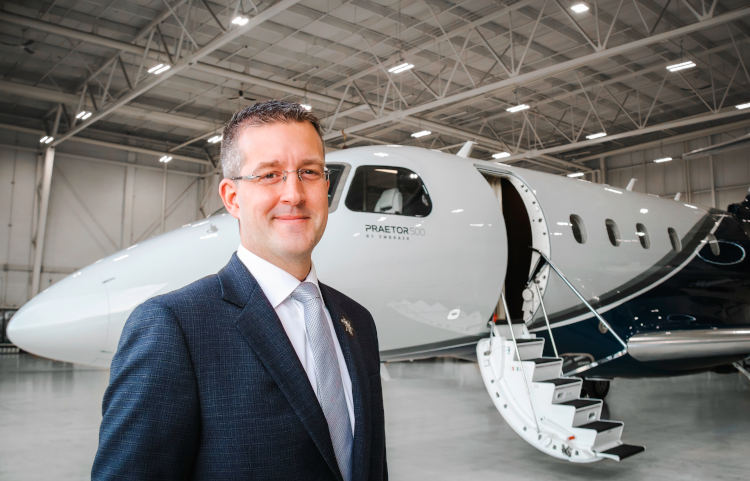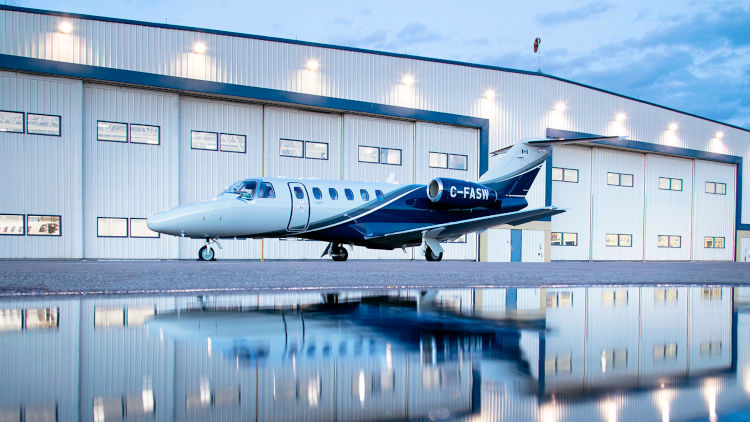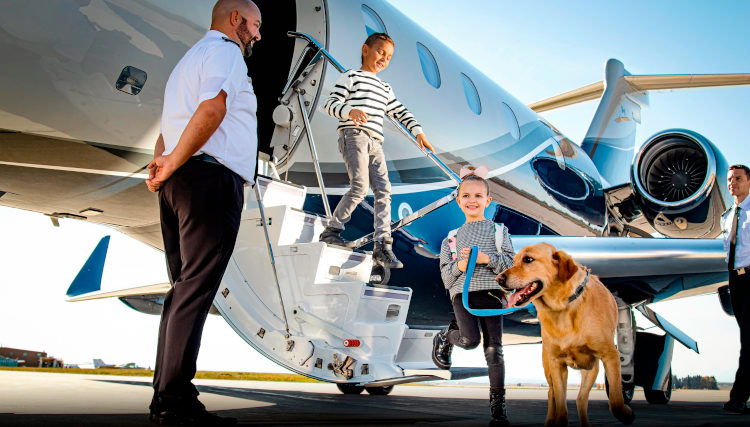AirSprint is Canada's largest fractional jet operator and North America's fourth largest, logging 27,333 flight hours according to ARGUS TraqPak data. The company saw 43% growth from 2021 to 2022 and has significantly added to its fleet over the last few years. SherpaReport spoke to AirSprint's President and CEO, James Elian, about the recent growth and plans for the future.
AirSprint now operates 13 Embraer Praetor 500/Legacy 450 mid-size jets, 12 Cessna Citation CJ3+ and 6 Cessna Citation CJ2+ light-jets, for a total fleet size of 31 aircraft. The company offers fractional jet ownership starting at a minimum of 25 Annual Hours of flight time, and customers can choose either a capital purchase model or a 5-year lease option. Owners can have a plane ready with as little as 8 hours' notice.
James Elian joined AirSprint as a first officer in 2001, shortly after the company was founded. He is well qualified for his role leading the company as he holds an MBA from the University of Calgary and a Master of Aeronautical Science degree from Embry-Riddle Aeronautical University – and still maintains an airline transport pilot license. He is a Canadian with a type of Canadian ethos that refreshes and revives, a believer in moderate and steady growth, with a profound commitment to sustainability.

SherpaReport was in conversation with him recently, where we discussed post-pandemic growth, new owner services provision, and the future of fractional aircraft in Canada and elsewhere.
SherpaReport: How much growth have you seen in the last few years in terms of adding aircraft and new clients? Has all of this changed post-pandemic?
Mr. Elian: I have been with AirSprint for over 20 years – and during that time, we have taken a methodical approach to ensure continuous and measured growth. Our steady growth pre-pandemic can, in part, be attributed to our simplified pricing model, commitment to providing personalized service, and to selecting the optimal aircraft, the Embraer Praetor 500 and Cessna Citation CJ3+, which are ideally suited for the unique Canadian geography. But in answer to the question, the pandemic did play a large part in our growth, and today we are double the size compared to the start of 2020. Once the pandemic began, Canadians, who historically are more conservative when it comes to private air travel, sought out a means to ensure a safe and secure alternative to commercial travel, and as the leading private aviation provider in Canada, our service offering made sense to many individuals and companies. The real opportunity that the pandemic provided was the increased number of successful Canadians who were looking for a private aviation solution.
SherpaReport: Do you think there are any deeper reasons for your growth?
Mr. Elian: I do. AirSprint was founded and has been led by pilots since the company introduced fractional ownership to Canadians in 2000. Professional pilots always have backup plans prepared when flying and this same approach was taken in developing the business model, and in developing our service offering. The result is that AirSprint has always been financially stable, and is able to pivot quickly to take advantage of opportunities as they arise. This approach helped us through the pandemic, as we were able to grow faster than the competition in a very challenging environment. Over the last few years, we have gone from 16 to 31 aircraft and could have added more. But I genuinely believe we are stewards, not owners, of our aircraft; because of that, our level of service when flying our fractional owners is the benchmark of our business. Growth is an important element of success, but it cannot come at the expense of service.

SherpaReport: How committed is AirSprint to sustainability and SAF fuels?
Mr. Elian: Community is one of our core values, and a part of that is ensuring that we are acting in way that minimizes our impact on the environment. Our dedication is ongoing; it is crucial to advance strategies that mitigate the climate impacts of flight operations as Canada moves toward a net-zero greenhouse gas (GHG) emissions future. In 2021, we were the first private aviation company to purchase sustainable aviation fuel (SAF) from a Canadian location and although it is an optimal method for minimizing our environmental footprint, there is not enough availability today for it to be the sole solution to the challenge. As such, in November 2022 we introduced our sustainability program, which includes purchasing third-party verified carbon offsets on behalf of our fractional owners. I am pleased to share that today over 91% of all AirSprint flights are carbon neutral, with a commitment to achieve 100% by 2025. Looking to the future, we have the opportunity and the responsibility to take this leadership further. Our action plan for the environment will be beneficial to us, our fractional owners and Canadian private aviation.
SherpaReport: Of the new planes you have added, which are the most popular, and why?
Mr. Elian: Well, I’m not sure that there is a definite answer to that question. Our fleet consists of two different aircraft types that were selected for two different mission types. Our fractional owners appreciate each type for their unique attributes, and several fractional owners have shares in both types. Embraer-type jets are popular because of their comfort, range, and speed, and the Citation CJ jets are appreciated for their combination of performance, flexibility, and great economics. When it comes down to deciding, we want our fractional owners to choose the right jet for the right mission. Since 2016, when we introduced the Embraer Legacy and Citation CJ3+ jets to the fleet, we have added an equal amount of each.

SherpaReport: Finally, are there notable trends that you can discuss for this year and in the upcoming years?
Mr. Elian: The pandemic saw a lot of people move to private aviation, including as whole aircraft buyers. With the uncertain economic conditions, we believe that there will be an increased focus from some of these buyers towards fractional ownership, so they can continue to see the benefits of private travel, but in a more economical way. Service experience will increasingly be important as there are still lots of industry challenges post-pandemic. Companies such as AirSprint, who take a proactive and predictive approach to anticipating the challenges will benefit and grow faster than those companies who are more reactive in their approach.

